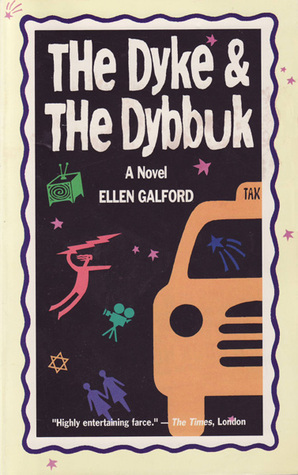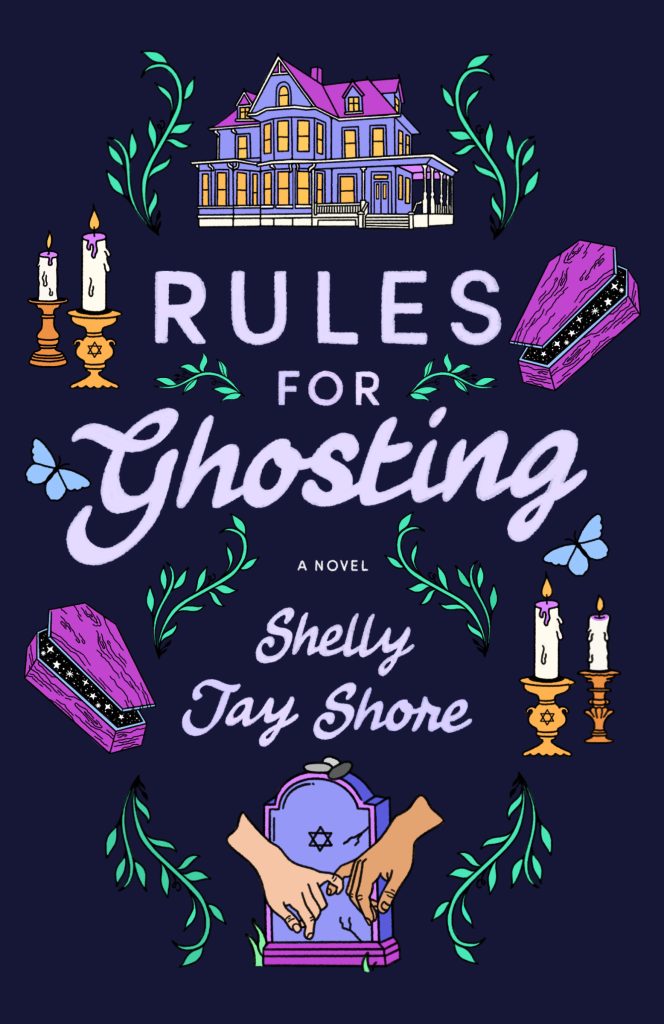Ghosts and spirits have a heavy presence in Jewish folklore, from Talmudic ghost-summoning rituals to Yiddish folk stories passed down through generations. There’s a touch of magic in those tales, always with the very Jewish common denominator that the unexplainable doesn’t need to be explained, that the mysterious doesn’t need to be solved.
When I tell people that the earliest drafts of Rules for Ghosting didn’t include any Jewish elements, I tend to get a lot of baffled looks in return. I understand why—the Jewishness of the story in its current form has made it the book that it is, and looking back at those initial outlines, the book is almost unrecognizable. It was a Jewish funeral that clicked that final missing puzzle piece into place, and the weight of grief, history, and community in the room that made me understand that whether or not you believe in ghosts, they have a presence all the same.
Judaism is about asking questions and fighting over the possible answers, and in Rules for Ghosting, there is, intentionally, no explanation given for why Ezra can see ghosts. In fact, his attempts to bring logic and order to the mystical, only show that while rules and limits might be a comfort, they don’t actually contain the uncontainable.
One of my favorite quotes about Judaism is that there are twice as many ways to be Jewish as there are Jews in the world, and in reading and researching Jewish folklore and ghost stories, I think I’ve determined that the same rule applies to Jewish novels as well. Jewish myths and legends lend themselves to an infinite number of possibilities for storytelling, and the addition of queerness to those narratives only adds to the potential for new exploration and depth. The books on this list are just a small sampling of the ways Jewish folklore—and all its related themes, griefs, and legacies—can take the stories we think we know and make them new again.
When the Angels Left the Old Country by Sacha Lamb
Imagine Good Omens, but a thousand times more Jewish, and with its central angel and demon characters focused on the simple task of helping one person, rather than thwarting the apocalypse. Lamb’s novel follows Uriel, an angel, and Little Ash (short for Ashmedai), a demon, who have been studying together in their tiny shtetl for centuries. When a young girl from their shtetl goes missing in America, Uriel and Little Ash set off to follow her. Along the way, they befriend Rose Cohen, a scrappy young lesbian still bristling from her best friend’s unexpected marriage, help the ghost of a rabbi find his daughter in America so that she can formally mourn him and prevent him from becoming a dybbuk, join a labor union, and stop a corrupt local factory owner. With elements of historical fiction, Jewish folklore, and explorations of what it means to be a person, Lamb has taken a traditional immigrant story, added a twist of fantasy, and created a gorgeous meditation on love, community, and identity.
City of Laughter by Temim Fruchter
This rich, immersive, deeply queer story spans four generations of Eastern European Jewish women, linked together in a chain of secrecy, trauma, curses, and family lore. With a nonlinear structure and multiple points of view, the plot begins with Shiva, a newly out queer Modern Orthodox Jew, mourning her father and attempting to repair her fractured relationship with her mother. Coming back again and again to S. Dansky’s The Dybbuk, a play she first watched with her father, Shiva enrolls in graduate school determined to explore the Jewish folklore as a connection to her family’s past, and ends up opening a door to a queer community that spans generations. Fruchter writes with a mix of academic expertise and almost dreamlike intimacy, bringing in meticulous research and a joyful engagement with queerness—past, present, and future.
Milk Fed by Melissa Broder
Hunger sits at the core of this 2019 novel—the hunger of desire, the hunger for intimacy, the hunger for acceptance, the hunger for a sense of a fulfilled self. Rachel, the main character, is a calorie-obsessed secular Jewish woman who finds herself fascinated with fat, frum Miriam, who works at her family’s frozen yogurt shop and refuses to accept Rachel’s insistence on only plain yogurt with no toppings. A therapy exercise resulting in a clay sculpture that Rachel decides is both a golem and a symbol for Miriam and all she represents leads to Rachel exploring Jewish mysticism and dreaming of Rabbi Judah Leow ben Bezazel, talking about divinity, desire, and the mitzvah of a good snack. Broder’s writing is at once irreverent and compassionate, and paints a portrait of yearning that makes every page glow.
The Sins on Their Bones by Laura R. Samotin
A more traditional fantasy, this debut is richly grounded in Eastern European Jewish mysticism and immersive from the first word until the how dare you, actually cliffhanger of the final page. Following Dmitri, the fallen tsar of Novo-Svitsevo, as he plots to retake his throne from his husband Alexey, who has used what he calls the Holy Science to make himself an unstoppable immortal. The Sins on Their Bones takes all of the elements of a brilliant fantasy—high stakes, meticulous worldbuilding, and incredible characters—and adds a deeply human element that refuses to shy away from trauma, abuse, and the ways that religion can be both a comforting balm and a twisted path to violence. Samotin’s knowledge of Jewish folklore infuses every page, blending recognizable prayers and rituals with obscure demonology and mystical traditions. I might be biased, but if The Sins on Their Bones launches a new genre of Jewish-inspired queer fantasy, I will be a happy reader indeed.
Depart, Depart! by Sim Kern
I couldn’t write this list without including another brilliant Jewish ghost story. Depart, Depart! seamlessly blends commentaries on social justice and climate change with meditations on community, identity, trauma, and sacrifice. The novella’s main character, Noah Mishner, finds himself seeking shelter in the Dallas Mavericks’ arena after a massive hurricane devastates the city of Houston. He finds a collection of other queer refugees, but fears that as conditions in the shelter deteriorate, his safety as a trans Jewish man will put him at risk—and that anxiety only builds as he starts to see visions of his great-grandfather, Abe, who fled Nazi Germany as a young boy. Depart, Depart! is deeply timely, forces the reader to dig into hard questions about who we are and what we value, and offers a profound hope for what becomes possible when we focus on connection, not despair.
From Dust, A Flame by Rebecca Podos
Elements of family and legacy are an inextricable part of any Jewish story, mystical or not, and From Dust, A Flame is no exception to the rule. Like City of Laughter, this novel explores self-discovery and the intergenerational impact of unresolved trauma; unlike City of Laughter, From Dust, A Flame brings a more literal transformation and physical manifestations of those family traumas. Hannah, the main character, follows a path of Jewish ancestry, legends, and family histories, as Podos seamlessly weaves themes of religion, bodily autonomy, gender identity, and queer desire. The elements of Jewish folklore add new dimension to some classic YA fantasy tropes, with a side of sweet romance and an emerging clarity of self not just for Hannah, but for the reader, as well. (Yes, I cried. So will you.)

The Dyke and the Dybbuk by Ellen Galford
A road trip novel with a queer Jewish twist—what more could you want? The Dyke and the Dybbuk is something of a cult classic, and might be one of the first great pieces of sapphic Jewish fantasy. An imprisoned demon breaks out of confinement to hunt down the descendant of a woman she was instructed to haunt nine generations ago, who happens to be a lesbian taxi driver in London. The choice to make Kokos, the titular dybbuk, the narrator of the story brings a wicked, irreverent edge to the story, which is as much a love letter to 90s lesbian culture as it is to Jewish folklore and ancestry. Galford explores humanity, queerness, and kinship with tenderness and humor, and has some of the most authentic Jewish family—born and found—that I’ve ever read.
Read the original article here

